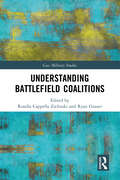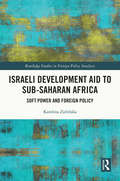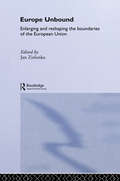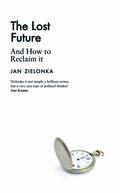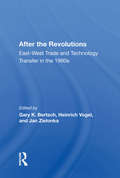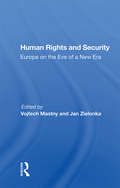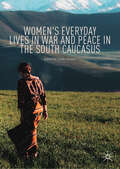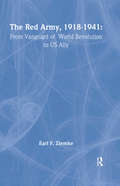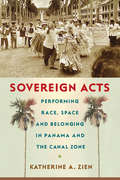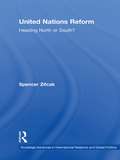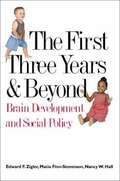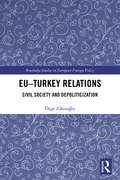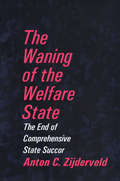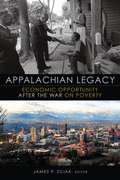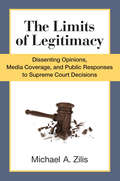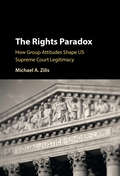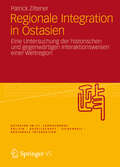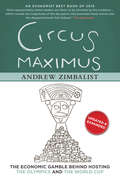- Table View
- List View
Understanding Battlefield Coalitions (Cass Military Studies)
by Rosella Cappella Zielinski Ryan GrauerThis book improves our understanding of battlefield coalitions, providing novel theoretical and empirical insight into their nature and capabilities, as well as the military and political consequences of their combat operations. The volume provides the first dataset of battlefield coalitions, uses primary sources to understand how non-state actors of varying types form such groupings, reports interviews with policymakers illuminating North Atlantic Treaty Organization operations, and uses cases studies of various wars waged throughout the nineteenth, twentieth, and twenty-first centuries to understand how other such collectives have operated. Part I introduces battlefield coalitions as an object of study, demonstrating how they are distinct from other wartime collectives. Using a novel dataset of actors fighting in 492 battles during interstate wars waged between 1900 and 2003, it provides, for the first time, a comprehensive portrait of the universe of battlefield coalitions. Part II explores processes and dynamics involved in the formation of battlefield coalitions, addressing how potential coalition members prepare for future battles in peacetime (as well as the consequences of such preparations) and the dynamics of mission design. Part III focuses on how battlefield coalitions are organised and fight when combat ensues, notably their decision-making rules and practices, command structures, and learning capacities. Part IV addresses three curious tendencies observed in the operations of battlefield coalitions: partners under-providing effort in combat, rebels and terrorist networks persisting in cooperation even when their interests diverge, and members defecting from the collective. Part V concludes with a chapter outlining for future researchers what we know about battlefield coalitions and what remains to be understood. This book will be of much interest to students of military and strategic studies, defence studies and International Relations.
Israeli Development Aid to Sub-Saharan Africa: Soft Power and Foreign Policy (Foreign Policy Analysis)
by Karolina ZielińskaThis book deals with Israeli development aid to Sub-Saharan Africa countries as a part of Israeli foreign policy. The analysis is framed by the concept of soft power: an assumption that development cooperation increases attractiveness of the donor and contributes to constructive bilateral and multilateral relations. Israel is a particular case of a donor, as it concentrates on technical aid and its aid is motivated by a particular set of ideological and pragmatic motives.Covering the period since the 1950s till today, the book analyses particular Israeli resources relevant for African development and the system and contents of Israeli development aid, with a particular focus on a new phenomenon of the engagement of businesses and NGOs.Zielińska explores the geopolitical context of Israeli aid for Sub-Saharan countries and the recipients’ perception of Israeli aid; asking if and how these attitudes influence the recipients’ behaviour towards Israel within their bilateral relations as well as on multilateral forums. Contributing to the knowledge of development diplomacy as a form of expression of soft power and as a tool of foreign policy, it will be of interest to international relations’ students and faculty as well as to other people professionally dealing with Israeli foreign policies.
Europe Unbound: Enlarging and Reshaping the Boundaries of the European Union (Routledge Advances in European Politics)
by Jan ZielonkaEurope Unbound provides an analysis of the enlargement of the European Union and examines from both a theoretical and a political approach issues such as:* Where does Europe end?* Should Europe's borders be open or closed?* How does the evolution of territorial politics impact on the course of European integration?This book draws upon such diverse fields as History, Sociology, Political Science and International Relations and contains contributions from an international range of respected academics.
The Lost Future: And How to Reclaim It
by Jan ZielonkaA timely and compelling argument for a revitalized and restructured global politics The future seems increasingly uncertain. Our democracies are failing to prevent financial crises, energy shortages, climate change, and war—so how can we look to the future with confidence? Jan Zielonka argues that it is democracy&’s shortsightedness that makes politics stumble in our increasingly connected world. With our governments still confined to the borders of nation-states, defending the short-term interests of present-day voters, the consequences for future generations are dire. In this incisive account, Zielonka makes a bold case for a new politics of time and space. He considers how democracy should adjust to the world of high speed, and he questions our everyday experiences as citizens: Is it acceptable for authorities and firms to monitor our whereabouts? Why is the distribution of time and space so unequal? And, most crucially, can we construct a new system of governance that will allow us to plan ahead with certainty?
After The Revolutions: East-west Trade And Technology Transfer In The 1990s
by Jan Zielonka Gary K. Bertsch Heinrich VogelThis book presents various aspects of the changing nature of East-West relations and attempts to anticipate future trends in East-West trade and technology transfer, dealing with the evolution of national approaches towards trade and technology transfer.
Human Rights And Security: Europe On The Eve Of A New Era
by Jan Zielonka Vojtech MastnyInquiries into the relationship between security and human rights are of very recent vintage. They have long been hampered by political scientists' predilection for political "realism." From that perspective, there seemed little doubt that power comes first and any human rights but a poor second. As wishful thinking turned into reality during the Eastern European revolutions of 1989, the limitations of such shortsighted realism became apparent. This book examines the causes and consequences of the emerging new relationship between security and human rights. It is divided into two parts, which deal respectively with security and human rights and their relationship to states and societies. What is the theoretical linkage between security and human rights? How has this linkage evolved within the context of East-West relations? What was the particular role of the Helsinki process in shaping this evolution? How do these issues affect the difficult transition from dictatorship to pluralism in countries facing the challenge of ethnic, economic, and social dislocation? The contributors to this volume seek to deepen our understanding of the forces that brought about the collapse of communism in Europe, and they explore the broader implications of change for the emerging post-cold war international order.
Contested Commemorations
by Benjamin ZiemannThis innovative study of remembrance in Weimar Germany analyses how experiences and memories of the Great War were transformed along political lines after 1918. Examining the symbolism, language and performative power of public commemoration, Benjamin Ziemann reveals how individual recollections fed into the public narrative of the experience of war. Challenging conventional wisdom that nationalist narratives dominated commemoration, this book demonstrates that Social Democrat war veterans participated in the commemoration of the war at all levels: supporting the 'no more war' movement, mourning the fallen at war memorials and demanding a politics of international solidarity. It describes how the moderate Socialist Left related the legitimacy of the Republic to their experiences in the Imperial army and acknowledged the military defeat of 1918 as a moment of liberation. This is the first comprehensive analysis of war remembrances in post-war Germany and a radical reassessment of the democratic potential of the Weimar Republic.
Women's Everyday Lives in War and Peace in the South Caucasus
by Ulrike ZiemerThis edited volume explores the everyday struggles and challenges of women living in the South Caucasus. The primary aim of the collection is to shift the pre-occupation with geopolitical analysis in the region and to share new empirical research on women and social change. The contributors discuss a broad range of topics, each relating to women’s everyday challenges during periods (past and present) of turbulent transformation and conflict, thus helping make sense of these transformations as well as adding new empirical insights to larger questions on life in the South Caucasus. Part I begins the discussion of women and social change in Armenia, Georgia and Azerbaijan by examining the contradictions between traditional gender roles and emancipation and how they continue to dictate women’s lives. Part II focuses on women’s experiences of war and conflict in Azerbaijan, Armenia, Georgia and Nagorny Karabakh, as well as displacement from Abkhazia and Azerbaijan. Part III examines the challenges faced by sexual minorities in Georgia and feminist activism in Azerbaijan. Women's Everyday Lives in War and Peace in the South Caucasus will be of interest to students and scholars across a range of disciplines, including sociology, politics, gender studies and history.
Zur Relevanz der schulischen Sozialbeziehungen für die politische Unterstützung im Jugendalter
by Johanna Fee ZiemesIn diesem Buch untersucht Johanna F. Ziemes die Relevanz von Sozialbeziehungen für die politische Sozialisation von Schüler*innen. Schüler*innen sind heranwachsende Bürger*innen, die Aspekte der politischen Unterstützung entwickeln und verleihen. Hierzu gehören Einstellungen, Identitäten und Werte. Die politische Unterstützung von den heranwachsenden Bürger*innen ist für Demokratien relevant. Auf Grundlage der Daten der International Civic and Citizenship Education Study 2016 (ICCS 2016) werden verschiedene schulische Bedingungen für die Entwicklung politischer Unterstützung untersucht und diskutiert. Besonders im Vordergrund stehen hier die schulischen Sozialbeziehungen als Aspekt des Schulklimas. Die vorgestellten Studien betonen die Relevanz der Sozialbeziehungen für die politische Sozialisation.
The Red Army, 1918-1941: From Vanguard of World Revolution to America's Ally
by Earl F ZiemkeSupported in large part by evidence released after the collapse of the Soviet Union, this book follows the career of the Red Army from its birth in 1918 as the designated vanguard of world revolution to its affiliation in 1941 with 'the citadel of capitalism', the United States. Effectiveness of leadership and military doctrine are particular conce
Sovereign Acts: Performing Race, Space, and Belonging in Panama and the Canal Zone
by Katherine A. ZienSovereign Acts explores how artists, activists, and audiences performed and interpreted sovereignty struggles in the Panama Canal Zone, from the Canal Zone’s inception in 1903 to its dissolution in 1999. In popular entertainments and patriotic pageants, opera concerts and national theatre, white U.S. citizens, West Indian laborers, and Panamanian artists and activists used performance as a way to assert their right to the Canal Zone and challenge the Zone’s sovereignty, laying claim to the Zone’s physical space and imagined terrain. By demonstrating the place of performance in the U.S. Empire’s legal landscape, Katherine A. Zien transforms our understanding of U.S. imperialism and its aftermath in the Panama Canal Zone and the larger U.S.-Caribbean world.
Globalisation and the Rule of Law (Challenges of Globalisation)
by Spencer ZifcakGlobalisation and the Rule of Law reassesses the idea of the 'rule of law' within the present complex and increasingly internationalized environment. There have been many books studying the phenomenon of globalization and its economic, social or cultural consequences. This book, however, is the first to relate globalization exclusively to law. It examines the impact of globalization upon the rule of law, a fundamental value within liberal democratic sovereign states. The book opens with three chapters discussing the theory of the rule of law and its necessary reconceptualization in a global environment. Then, in three sections considering global trade, security and human rights, it proposes new ways of thinking about global law and its application in new and existing institutions of global governance. Contributors include top-flight academics, politicians and judges, making this book significant and relevant in both jurisprudential theory and political practice.
United Nations Reform: Heading North or South? (Routledge Advances in International Relations and Global Politics)
by Spencer ZifcakThis book examines recent attempts at reform within the United Nations in the wake of the institutional crisis provoked by the invasion of Iraq. It contends that efforts at reform have foundered owing to fundamental and bitter political disagreements between the nations of the global North and South. Following profound discord in the Security Council in the lead up to the US-led invasion of Iraq in 2003, this book considers the ambitious programme of reform instigated by then serving UN Secretary-General Kofi Annan. The author of this highly topical work, Spencer Zifcak, subjects six of Annan’s principal proposals for reform to scrutiny: the reform of the Security Council, the General Assembly, and the Human Rights Council, and suggested alterations to international law with respect to the use of force in international affairs, the ‘responsibility to protect’, and UN strategies to counter global terrorism. On the basis of these detailed case-studies, the book demonstrates why so few proposals for reform were eventually adopted. It argues that the principal reason for this failure was that nations of the North and South could not agree as to the merits of the reforms proposed, exposing the sharply differing visions held by member states for a future and improved United Nations. Founded upon extensive interviews with diplomats at the United Nations, the book provides a rare ‘insider’ account of UN politics and practice. It will be of vital interest to students, scholars and practitioners of International Relations, International Law, and International Institutions.
The First Three Years and Beyond: Brain Development and Social Policy
by Edward F. Zigler Matia Finn-Stevenson Nancy W. HallDrawing on the latest research from the social sciences and studies on the brain to answer questions and exploring what they mean for social policy and child and family development, this book offers recommendations for child care and development based on current brain research and its implications. A must-read for parents and policy makers alike.
The Pre-K Debates: Current Controversies and Issues
by Edward Zigler Walter S. Gilliam W. Steven BarnettThis book gathers a who's who of more than 40 leading thinkers in early childhood education for a rigorous examination of the most-debated pre-K issues.
Disappointment: Toward a Critical Hermeneutics of Worldbuilding
by Jarrett ZigonIncreasingly, anthropologists, political theorists and philosophers are calling for imaginative and creative analyses and theories that might help us think and bring about an otherwise. Disappointment responds to this call by showing how collaboration between an anthropologist and a political movement of marginalized peoples can disclose new possibilities for being and acting politically. Drawing from nearly a decade of research with the global anti-drug war movement, Jarrett Zigon puts ethnography in dialogue with both political theory and continental philosophy to rethink some of the most fundamental ontological, political and ethical concepts. The result is to show that ontological starting points have real political implications, and thus, how an alternative ontological starting point can lead to new possibilities for building worlds more ethically attuned to their inhabitants.
European Union Civil Society Policy and Turkey: A Bridge Too Far? (Palgrave Studies in European Union Politics)
by Özge ZihnioğluDrawing on interviews with Civil Society organizations and in conjunction with an examination of EU Civil Society Policy and the legal and institutional environment in Turkey this book examines EU policies on Turkish Civil Society organizations and highlights the significant constraints and limited impacts of these policies.
EU–Turkey Relations: Civil Society and Depoliticization
by Özge ZihnioğluThis book focuses on the hidden but ever-present civil society dimension of the EU’s policies towards Turkey and uncovers the pitfall of EU–Turkey relations. It establishes the growing depoliticization of Turkish civil society (in contrast to what the EU’s policies aimed for) and engages with the questions of why and how Turkish civil society depoliticized. It discusses how Turkey’s retreating democracy, and the intense polarization in Turkish political and social life make rights-based activism more difficult. Finally, this book investigates what implications Turkish civil society’s depoliticization bears for EU–Turkey relations, reveals the diminishing leverage of the EU’s policies and discusses how this reflects on Turkey’s already closing civic space. It explains why and how EU-Turkey relations deteriorated over the last decade, examines the current stalemate, and discusses why civil society matters. This text will be of key interest to scholars and students in the field of EU–Turkey relations, Turkish studies and civil society studies as well as more broadly to NGOs, European studies and politics, and International Relations.
The Waning of the Welfare State
by Anton ZijderveldThe welfare state in postwar Western Europe has been extended and intensified in a spectacular manner. Today, "welfare" represents a complex mix of services covering health, education, welfare, the arts, leisure, and social security. Anton C. Zijderveld is of the opinion that Europe's vast, comprehensive welfare state is becoming leaner and meaner, heading down a more sober path toward decentralization and deregulation, which only, but not merely, secures order for its citizens and shields society's vulnerable. As the millennium approaches, Zijderveld believes Europe is experiencing a cultural renaissance and a socioeconomic and political reformation in which the market will flourish and civil society will prosper.The Waning of the Welfare State focuses on the transformation of the welfare state in Europe over a four-decade period. Zijderveld employs the democratic triangle theoretical model, in which democracy is viewed as a system in which state, market, and civil society are held in precious balance. If one component supersedes the other two, democracy is endangered. In its 1960s and 1970s heyday, the state took center stage at the expense of the market and civil society; social democracy was the prevailing ideology. In the 1980s the market triumphed, often at the expense of both the state and civil society; this was the decade of liberalism. Today, civil society prevails, albeit at risk of being injurious to state and market. Ideologically, this is the decade of conservatism.Zijderveld sees a future "Americanization" of European social policy producing a fortuitously balanced coalition of social democracy, liberalism, and conservatism; a place where safety and order, prosperity and economic participation, and social participation and meaningful interactions flourish equally. This transformation carries many risks. But it will, in the end, strengthen Europe's political, economic, and sociocultural stamina. If it also draws the Atlantic partners closer together, as Zijderveld believes it does, the chances of another European communist, libertarian, or fascist Gtterdommerung will remain remote. Zijderveld presents useful concepts in a highly organized fashion. He has produced a very important book for American readers who will, hopefully, discover, beyond the often vast differences, some basic similarities of structures and developments within the European welfare state.
Appalachian Legacy
by James P. ZiliakIn 1964 President Lyndon Johnson traveled to Kentucky's Martin County to declare war on poverty. The following year he signed the Appalachian Regional Development Act, creating a state-federal partnership to improve the region's economic prospects through better job opportunities, improved human capital, and enhanced transportation. As the focal point of domestic antipoverty efforts, Appalachia took on special symbolic as well as economic importance. Nearly half a century later, what are the results? Appalachian Legacy provides the answers.Led by James P. Ziliak, prominent economists and demographers map out the region's current status. They explore important questions, including how has Appalachia fared since the signing of ARDA in 1965? How does it now compare to the nation as a whole in key categories such as education, employment, and health? Was ARDA an effective place-based policy for ameliorating hardship in a troubled region, or is Appalachia still mired in a poverty trap? And what lessons can we draw from the Appalachian experience?In addition to providing the reports of important research to help analysts, policymakers, scholars, and regional experts discern what works in fighting poverty, Appalachian Legacy is an important contribution to the economic history of the eastern United States.
Appalachian Legacy
by James P. ZiliakIn 1964 President Lyndon Johnson traveled to Kentucky's Martin County to declare war on poverty. The following year he signed the Appalachian Regional Development Act, creating a state-federal partnership to improve the region's economic prospects through better job opportunities, improved human capital, and enhanced transportation. As the focal point of domestic antipoverty efforts, Appalachia took on special symbolic as well as economic importance. Nearly half a century later, what are the results? Appalachian Legacy provides the answers.Led by James P. Ziliak, prominent economists and demographers map out the region's current status. They explore important questions, including how has Appalachia fared since the signing of ARDA in 1965? How does it now compare to the nation as a whole in key categories such as education, employment, and health? Was ARDA an effective place-based policy for ameliorating hardship in a troubled region, or is Appalachia still mired in a poverty trap? And what lessons can we draw from the Appalachian experience?In addition to providing the reports of important research to help analysts, policymakers, scholars, and regional experts discern what works in fighting poverty, Appalachian Legacy is an important contribution to the economic history of the eastern United States.
The Limits Of Legitimacy: Dissenting Opinions, Media Coverage, And Public Responses To Supreme Court Decisions
by Michael A. ZilisWhen the U. S. Supreme Court announces a decision, reporters simplify and dramatize the complex legal issues by highlighting dissenting opinions and thus emphasizing conflict among the justices themselves. This sometimes sensationalistic coverage fosters public controversy over specific rulings despite polls that show that Americans strongly believe in the Court's legitimacy as an institution. In The Limits of Legitimacy, Michael A. Zilis illuminates this link between case law and public opinion. Drawing on a diverse array of sources and methods, he employs case studies of eminent domain decisions, analysis of media reporting, an experiment to test how volunteers respond to media messages, and finally the natural experiment of the controversy over the Affordable Care Act, popularly known as Obamacare. Zilis finds that the media tends not to quote from majority opinions. However, the greater the division over a particular ruling among the justices themselves, the greater the likelihood that the media will criticize that ruling, characterize it as "activist," and employ inflammatory rhetoric. He then demonstrates that the media's portrayal of a decision, as much as the substance of the decision itself, influences citizens' reactions to and support for it. This meticulously constructed study and its persuasively argued conclusion advance the understanding of the media, judicial politics, political institutions, and political behavior. Book jacket.
The Rights Paradox: How Group Attitudes Shape US Supreme Court Legitimacy
by Michael A. ZilisThe US Supreme Court is the chief institution responsible for guarding minority rights and equality under the law, yet, in order to function authoritatively, the Court depends on a majority of Americans to accept its legitimacy and on policymakers to enforce its rulings. The Rights Paradox confronts this tension, offering a careful conceptualization and theory of judicial legitimacy that emphasizes its connection to social groups. Zilis demonstrates that attitudes toward minorities and other groups are pivotal for shaping popular support for the Court, with the Court losing support when it rules in favor of unpopular groups. Moreover, justices are aware of these dynamics and strategically moderate their decisions when concerned about the Court's legitimacy. Drawing on survey and experimental evidence, as well as analysis of Court decision-making across many recent high-profile cases, Zilis examines the implications for 'equal justice under the law' in an era of heightened polarization and conflict.
Regionale Integration in Ostasien
by Patrick ZiltenerEine Weltregion ist eine Subagglomeration, die sich durch eine signifikant höhere Interaktionsdichte in einem umfassenderen, heute globalen Weltsystem auszeichnet. Stellt Ostasien - von China, Korea und Japan im Norden bis Indonesien im Süden - eine solche Weltregion dar? Zur Beantwortung der Frage nach dem Regionencharakter Ostasiens werden in dieser umfassenden Studie regionale und globale Geschehenszusammenhänge in ihrer historischen Tiefe rekonstruiert. Seit der Verstetigung der Kontakte in den ersten Jahrhunderten der westlichen Zeitrechnung erlebte Ostasien mehrere Schübe intensivierter wirtschaftlicher, politischer und kultureller Integration. Nach einem Tiefpunkt im Gefolge des 2. Weltkrieges, der Entkolonialisierung und Unabhängigkeitskriege ermöglichten die Öffnungs- und Reformprozesse seit den späten 1970er Jahren die rasche Wiederverflechtung der Region. Detailliert untersucht werden das oft informelle Zusammenspiel wirtschaftlicher und politischer Regionalisierung, die Funktionen regionaler Organisationen wie etwa der Asiatischen Entwicklungsbank (ADB) und der transpazifischen Asia Pacific Economic Cooperation (APEC), sowie die außenpolitischen Interessen und Strategien Japans, Chinas und der ASEAN-Länder im sich herausbildenden ASEAN plus-System in Ostasien. Es geht dabei um Weichenstellungen, die nicht nur Ostasien als Weltregion auf dem Weg zu einer Gemeinschaft, sondern auch die politische Weltökonomie über Jahrzehnte hinaus prägen werden.
Circus Maximus
by Andrew ZimbalistAthletes compete for national honor in Olympic and World Cup games. But the road to these mega events is paved by big business. We all know who the winners on the field are-but who wins off the field?The numbers are staggering: China spent $40 billion to host the 2008 Summer Olympic Games in Beijing and Russia spent $50 billion for the 2014 Sochi Winter Games. Brazil's total expenditures are thought to have been as much as $20 billion for the World Cup this summer and Qatar, which will be the site of the 2022 World Cup, is estimating that it will spend $200 billion.How did we get here? And is it worth it? Those are among the questions noted sports economist Andrew Zimbalist answers in Circus Maximus: The Economic Gamble Behind Hosting the Olympics and the World Cup. Both the Olympics and the World Cup are touted as major economic boons for the countries that host them, and the competition is fierce to win hosting rights. Developing countries especially see the events as a chance to stand in the world's spotlight.Circus Maximus traces the path of the Olympic Games and the World Cup from noble sporting events to exhibits of excess. It exposes the hollowness of the claims made by their private industry boosters and government supporters, all illustrated through a series of case studies ripping open the experiences of Barcelona, Sochi, Rio, and London. Zimbalist finds no net economic gains for the countries that have played host to the Olympics or the World Cup. While the wealthy may profit, those in the middle and lower income brackets do not, and Zimbalist predicts more outbursts of political anger like that seen in Brazil surrounding the 2014 World Cup.
